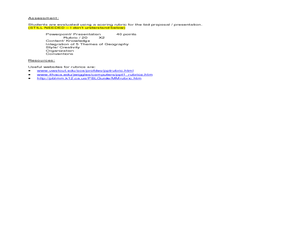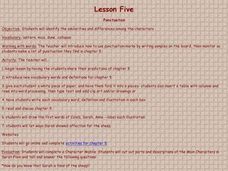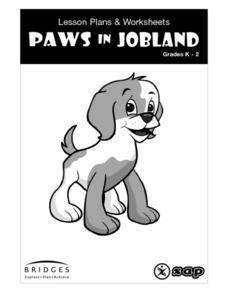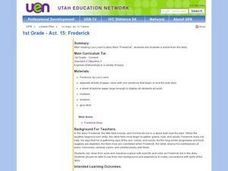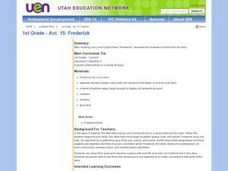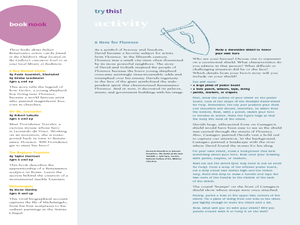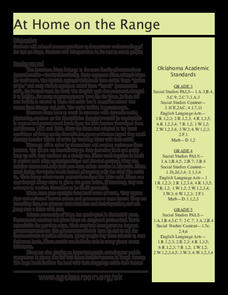Curated OER
Your Chapter in Snowboard History
Students are challenged to discover facts about snowboarding and write their own chapter for an imaginary book on snowboard history for publication on the World Wide Web.
Curated OER
The Coldest Continent
Students use the internet to conduct research on the continent of Antarctica. As a class, they review the continent's climate and the reasons behind the cold temperatures. After reading an article, they draw a picture of what they...
Curated OER
Who's Up for the Olympic Challenge?:Integrating the 5 Themes of Geography with Olympic Bids
Students explore geographical themes. In this problem solving geography lesson, students view a PowerPoint presentation about the Vancouver/Whistler Olympic bid. Students analyze Vancouver as an Olympic site looking at location, place,...
Curated OER
Underground Railroad- People Get Ready...There's a Train a Comin'
Students learn about the Underground Railroad. In this Civil War and slavery lesson, students discuss how successful slaves would be moving around at night, learn the secret vocabulary used for escape routes and review background about...
Curated OER
Jeffrey and Sloth
Students listen to the story Jeffrey and Sloth and explore the six traits of writing. In this six traits of writing lesson, students practice doodling as a method of brainstorming ideas. Students then discover the importance of...
Curated OER
Snowy Day
Students investigate the concept of reading comprehension while focusing upon the sequencing of a story. They read the story and use the cutouts included in the lesson to put the story in order. Students also engage in a class discussion.
Curated OER
Reading Comprehension
In this reading comprehension worksheet, students read a short passage entitled, "Fixing the Roof", answer 7 multiple choice questions, fill in 6 blanks with vocabulary words and answer 1 question with a paragraph.
Curated OER
Sarah Plain and Tall- Lesson 5
Students read a chapter in a book. In this character comparison lesson, students predict what will happen in chapter 5 of Sarah Plain and Tall, learn new vocabulary words, read and discuss chapter 5 and draw the first words of three...
Curated OER
The "Reading Rainbow" Series
Second graders watch a show to gather information about a career. In this careers lesson, 2nd graders watch Reading Rainbow and participate in a class discussion about the occupation presented in the show. Lesson includes extension ideas.
Curated OER
All About Penguins
Second graders research penguins. In this all about penguins lesson, 2nd graders identify facts from their readings and write an expository paper using proper capitalization and punctuation.
Curated OER
Literature: Frederick
First graders read Frederick and illustrate a scene from the story. They connect their own backgrounds and experiences with scenes in the story. They identify the setting and conflict of the story.
Curated OER
Frederick
First graders listen to a read aloud of Leo Lionni's, Frederick, and illustrate a scene from the story.
Curated OER
What is Important to You?
Students examine the life of Frida Kahlo, a Mexican artist known for her self-portraits. After discussing her works and life as an artist, students use mirrors to examine their faces and begin drawing their own self-portraits.
Curated OER
HAMLET HOOK
Students their personal reactions to issues of family relationships in light of the the plot, characterization, and themes of the play. They analyze the characters of Hamlet on an emotional level not just intellectual.
Curated OER
At the Crossroads
Third graders explore where South Africa is and then research details about the country to fully assess the background to the book, "At the Crossroads." They receive a map of Africa and color in the country of South Africa and list five...
Curated OER
Holiday Giving From the Classroom
Students participate in a holiday giving activity to learn about community involvement. In this community outreach lesson, students discuss giving and receiving as well as the gift of time. Students prepare songs and holiday cards to...
Curated OER
All Aboard!
Students research the history and background of snowboarding as well as the two main types of competition; the Giant Slalom and the Halfpipe. They find the schedule of past and future events and plot the locations of as many of these...
Curated OER
Self Portraits
Students study themselves in a mirror paying close attention to every attribute on their face. In this self portrait lesson students create a self portrait the same way as Rembrandt has done many times. Students also ask themselves a...
Curated OER
Famous Artwork
Students study the different portrayals of the artwork The David and answer short answer questions about it. In this The David lesson plan, students see different versions of the biblical figure, and read about its background. Then they...
Curated OER
Snowy Evening Poetry for ESL (Elementary, Literature)
Young scholars read Robert Frost's Stopping by the Woods on a Snowy Evening, illustrated by Susan Jeffers (2001). This is a wonderful book with beautiful illustrations that go with each line of the poem.
Curated OER
What in the World Is Snowboarding?
Learners research the sport of snowboarding in-depth, and divide into small groups to create an entertaining, multimedia newsletter on the sport.
Curated OER
At Home On The Range
Young scholars explore the history and domestication of the Bovidae family and their importance to our prairie ecosystem. Using a map of the United States, students located the American Great Plains. They complete worksheets and...
Curated OER
At Home on the Range
Fifth graders complete a worksheet. In this bison and great plains lesson, 5th graders read information about bison and complete a worksheet of comprehension questions. Students locate the American Great Plains on a map and answer the...
Curated OER
English - "What, Why, When, How, Where, Who?" - Framing Questions to Obtain Information
Students explore interviewing skills. In this interviewing skills lesson, students frame questions to obtain informative answers as they use what, why, when, how, where, and who questions.




